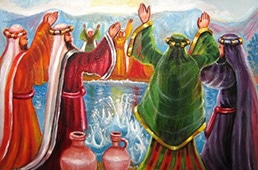
Feminine or Masculine?



Shalom,
This Shabbat we will read the Torah portion ‘Hukat’.
Our portion tells us that after forty years of journeying through the desert, the people of Israel arrive in the wilderness of Zin.
Miriam dies, and the people thirst for water.
Question:
What is the connection between Miriam’s death and the lack of water?
Millions of Jewish people survived in the desert for forty years. It was possible only through a miracle.
During their travels through the desert, the Jewish people were accompanied by a rock from which an abundant supply of water constantly flowed.
It was called Miriam’s Well – באר מרים.
This supply of water was due to Miriam’s merit being a rightious woman.
And now with her death, Miriam’s Well ceased to function and the people were faced with a critical water shortage.
The verse goes on to say, “Gather the people together, and I will give them water,” because the well of Miriam dried up when she died, and it returned in the merit of Moses.
קַח אֶת-הַמַּטֶּה, וְהַקְהֵל אֶת-הָעֵדָה אַתָּה וְאַהֲרֹן אָחִיךָ, וְדִבַּרְתֶּם אֶל-הַסֶּלַע לְעֵינֵיהֶם, וְנָתַן מֵימָיו; וְהוֹצֵאתָ לָהֶם מַיִם מִן-הַסֶּלַע,
וְהִשְׁקִיתָ אֶת-הָעֵדָה וְאֶת-בְּעִירָם
Take the rod, and assemble the congregation, thou, and Aaron thy brother, and speak ye unto the rock before their eyes, that it give forth its water; and thou shalt bring forth to them water out of the rock; so thou shalt give the congregation and their cattle drink. (Num. 20:8)
Accordint to the Midrash there were 12 streams (one for each tribe) and the water gushed forth from the well and filled these streams that then flowed to all sides for the 600,000 people to draw water from that well.
This Torah portion actually describes the last – 40th year of being in the desert before entering the promised land of Israel. People of Israel reached a place called Be’er – באר in Hebrew ‘a well’.
But notice and interesting phenomenon about this word:
וּמִשָּׁם, בְּאֵרָה: הִוא הַבְּאֵר, אֲשֶׁר אָמַר יְהוָה לְמֹשֶׁה, אֱסֹף אֶת-הָעָם, וְאֶתְּנָה לָהֶם מָיִם
And from thence to Be’er; that is the well whereof the LORD said unto Moses: ‘Gather the people together, and I will give them water
(Num. 21:16)
At the beginning of this verse the word Be’er in Hebrew is spelled with the letter ‘Hey’ at the end בְּאֵרָה – Be’erah.
This, of course, could mean “to/toward Be’er”, similarly to
‘HA’BAITAH’ – הביתה – to the house.
But on the other hand it may allude to the feminine aspect of the well by having the letter ה ‘Hey’ at the end of this word.
This is especially striking since the verse continues with:
“…that is the well…”
הִוא הַבְּאֵר
Here the word באר is preceded by the masculine הוא (he)
but the vowels make it be pronounced as היא (she), since there is the “ee” sound (‘hirik’ vowel) under the first letter ה
Kabalistic Teaching
Kabbala pays special attention to this phenomenon and explains that at first it represents the feminine aspect.
Later the male and female are joined, and that union is called by the masculine aspect, which is used even though the word “well” is feminine, in order to indicate this unity.
Then, when the Israelites camped and wanted water, they would stand on the side of the stream bed and sing a song, “Spring up, O well…” (Num. 21:17)
“Raise up source of waters, so there will be enough water for all Israel and for the herds”.
Thus they would sing praises to that higher well “The Princes dug the well, the nobles of the people excavated it with their scepter and their staves.” (Num. 21:18)
They would say words of truth, and thus it would happen.
From here we learn that whoever wishes to awaken and draw down things from above, whether by actions or words, will achieve nothing unless the action or words are done in a proper fitting manner.
People pray to awaken something from above but there are only a few who know how to do so.
G-d is close to all those who know how to call Him and to arouse response in the proper way.
If people don’t know how to relate to Him, then He is not close to them as is written: “G‑d is near to all those who call upon him, to all who call upon Him in truth.” (Psalms 145:18)
קָרוֹב יְהוָה, לְכָל-קֹרְאָיו לְכֹל אֲשֶׁר יִקְרָאֻהוּ בֶאֱמֶת
What do the words “in truth” – באמת mean?
They indicate that they know how to awaken a true response, appropriate to the each and every request.
So, in our text about the spring, Israel would say these words, spoken in truth, in order to awaken a response from the spiritual source of unity (masc + fem) of that spring and provide water to Israel.
Until Israel spoke the words of the song the spring would not flow.
And now a little bit of Hebrew:
The Hebrew word Truth אמת (EMET) consists of 3 letters:
א – Alef, the first letter of the Hebrew alphabet.
מ – Mem, the middle letter of the Hebrew alphabet.
ת – Tav, the last letter of the Hebrew alphabet.
Truth has to stay firm and solid.
So, if you deny (omit) the truth of its last letter ת – Tav, you get the word אם, meaning ‘on condition’.
And if you deny (omit) the truth of its first letter א – Alef, you get the word מת, meaning ‘dead’.
-
Really – באמת – (BE’EMET)
-
Absolutely true – אמת לאמתה – ‘EMET LA’AMITAH‘
-
Very true – אמת ויציב – ‘EMET VE’YATZIV‘
- With no Doubt – באמת ובתמים – ‘BE’EMET U’VE’TAMIM’
Listen now to a nice song:
קָרוֹב יְהוָה, לְכָל-קֹרְאָיו לְכֹל אֲשֶׁר יִקְרָאֻהוּ בֶאֱמֶת
https://www.youtube.com/watch?v=V1mSCH2Rjro
Many people ask us for a permission to redistribute our newsletters – by all means, please do feel free to forward this newsletter to anyone you wish!
Shabbat Shalom
Yoel & Orly
Our archive of posts and newsletters may be found at:
https://www.ulpanor.com/category/newletter/







